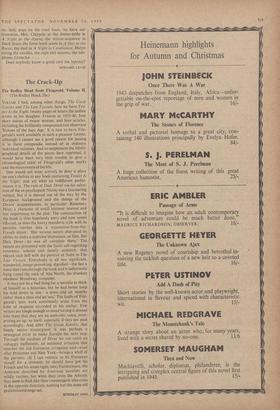The Crack-Up
The Bodley Head Scott Fitzgerald, Volume H. (The Bodley Head, 20s.)
VOLUME 1 had, among other things, The Great Gulsby and The Last Tycoon; here we have Ten- der Is the Night, twenty pages of letters the author wrote to his daughter Frances in 1933-40, four short stories of minor interest, and four articles. including the brilliantly compressed and observant 'Echoes of the Jazz Age.' It is nice to have Fitz- gerald's work available in such a pleasant format, although I cannot see a good reason for issuing it in these compendia instead of in ordinary individual volumes. And to supplement the biblio- graphical details of the pieces here reprinted, it would have been very little trouble to give a chronological table of Fitzgerald's other works and the main events of his life.
One would not want actively to deny a place on one's shelves to any book containing Tender Is the Night; and yet what an indifferent perfor- mance it is. The ruin of Dick Diver via his salva- tion of the ex-psychopath Nicole was a fascinating subject, but it is shoved out of the way by the European background and the doings of the Divers' acquaintances, in particular Rosemary Hoyt. a character of small intrinsic interest and less importance to the plot. The construction of the book is thus hopelessly awry and now seems affected, as does the heavy mandarin style with its periodic lurches into a translation-from-the- French idiom : 'Her serious nature distrusted its ability to make a supreme impression on him. But Dick Diver—he was all complete there.' The people are presented with the facile self-regarding reverence, solemn and faintly snobbish, that played, such hell with the portrait of Stahr in The Last Tycoon. Everybody is all too significant. wonderful, image-provoking, dignified---the last a word that runs through the book and is ludicrously hung round the neck of Abe North, the drunken deadbeat Broadway composer.
It may not be a bad thing for a novelist to think of himself as a historian, but he had better keep his field down to size : a town and six months rather than a class and an 'era.' The faults of Fitz- gerald's later work notoriously arose from the kind of response accorded to his earlier. Few writers are tough enough to stand having it dinned into them that they are an authentic voice, inter- preting an ag to itself, especially if they are paid accordingly. And after The Grew Gatsby, that lonely native masterpiece, it was perhaps a strategical error to make Europe the next step. Through the medium of Diver we can catch an unhappy bafflement, an outdated irritation that matches the old European arrogance and—even after Princeton and New York—brings a whiff of the parvenu. (If I can venture to be European myself for a moment, he should have got his French and his wines right, too.) Furthermore, the Americas described by American novelists are wildly various, but when they cross the Atlantic they seem to find, like their counterparts who cross in the opposite direction, nothing but the same old prefabricated stage-set.
KINGSLEY AMIS






































































 Previous page
Previous page